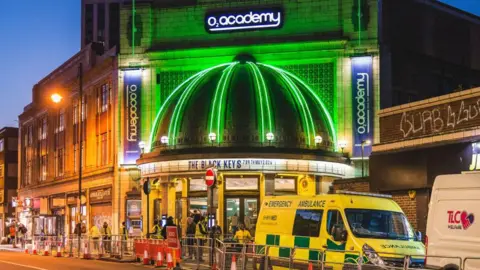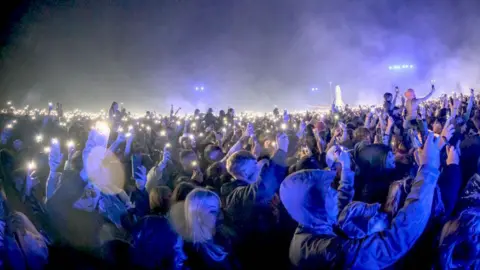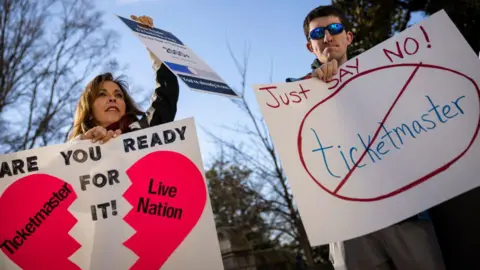Oasis: A ticketing debacle – and a tangled web of companies
 Getty Images
Getty ImagesPresumably Oasis had no inkling that the frenzy of hundreds of thousands trying to buy tickets for their hotly anticipated return to live performance might draw the eye of the UK government.
The use of ‘dynamic pricing’, which pushed up the cost of tickets by more than £200 as demand rose, triggered outbursts of fury from fans, while this week the Culture Secretary Lisa Nandy declared that tickets should be ‘at fair prices’.
The band claimed that it had not known that dynamic pricing was to be used and had left prices to be decided by the promoters and management. Oasis has since announced extra dates, sold through a ballot system by invitation.
Ticketmaster – which claims to be the world’s largest ticketing platform and one of three of the official sellers for the Oasis dates – said it did not set policy on ticket pricing: that policy was determined by the artists and promoters.
Yet as Ticketmaster frames it, that cut is more clear than it actually is. The fact is that there are three Oasis reunion tour promoters, and all of them are in some way associated with a single company: Live Nation, the US-based multinational corporation that owns Ticketmaster.
The promoters are Manchester-based SJM Concerts, MCD Promotions and DF Concerts.
SJM is virtually 100 per cent owned by Simon Moran and is one of the three biggest concert promoters in the UK. It also runs gigsandtours.com, one of the three official ticket vendors for the Oasis tour. (The others are See Tickets, a company owned by the German firm CTS Eventim)
SJM is also intertwined with Live Nation through a joint venture it has entered into with one of its subsidiaries. Further, or most importantly, Mr Moran or SJM and its subsidiary companies are listed as shareholders or directors of more than 10 of its subsidiary companies.
They also include one of the other promoters of the Oasis gigs, DF Concerts – according to records at Companies House, Mr Moran is a director and owns 20% of the shares.
The rest of the shares in DF Concerts are held by … a Live Nation subsidiary.
 Getty Images
Getty ImagesLive Nation has interests in several venues, including the O2 Academy Brixton
At the same time, MCD Productions was affiliated with the same Live Nation subsidiary in 2019 and investigated by the UK’s competition regulator as a possible merger. (The move was ultimately allowed to proceed, because it did not ‘raise competition concerns’.)
If when you arrive at the gig, you head to the merchandise stall for a souvenir of a good night out – whoops, there’s Live Nation again, what a coincidence, because Live Nation has interests in several merchandise companies, including De-Lux Merchandising, which makes official T-shirts, posters, books, hats and other gear that fans snap up.
Safety at that Oasis gig will be guaranteed by stewards and security. Showsec is the biggest of these in the UK – and did you guess? Yes, it’s a Live Nation subsidiary.
Live Nation also has interests in several venues. It owns and operates Cardiff Arena.
It also has a holding in the Academy Music Group, with venues across the UK including the O2 Academy Brixton, O2 Shepherds Bush Empire and the O2 Academy Glasgow. Simon Moran is a stakeholder in the Academy Music Group.
And Live Nation, for its part, has a division called Artist Nation which ‘offers global touring deals and festival performances, as well as artist management’. Oasis are managed by an independent firm called Ignition Management.
The festival season is over in the UK, and you would be right to guess that Live Nation has a large number of those too – including Creamfields Festival in Cheshire (which headlines with DJs Starling, Calvin Harris and Charlotte de Witte), Manchester’s Parklife and The Great Escape (all 2023 dates). Boomtown in Hampshire and one of the biggest independent UK festivals, hailed for its rebellious counterculture, sold a minority stake for 2022 to Live Nation and SJM.
Its latest move is to buy Live Nation, which itself owns a number of promoters including Festival Republic, the UK’s leading festival promoter (responsible for Reading and Leeds, Wireless and Latitude among others).
 Getty Images
Getty ImagesSo is it a good thing for consumers for one company to be involved in so much of the live music in the UK?
Meanwhile, the Competitions and Markets Authority (CMA), which supervises the enforcement of consumer laws and promotes competition in the marketplace, ‘is taking stock’ of recent developments in the ticketing market and has said publicly it is ‘urgently reviewing the ticketing market’. The CMA has the power to accelerate our progress.
Consumer protection law says that businesses must deal fairly with consumers and give clear and accurate information about the price that consumers must pay. Businesses which do not meet these obligations may breach the law.
Part of this might be because they have a high market share and you just haven’t got anywhere else to go. In that case, another reason for a company to be able to charge these big, apparently unfair prices could be competition law, specifically if they have a so-called dominant position, and if they do then they must not abuse that in a way that’s anti-competitive and produces an adverse effect on competition in the UK.
According to the CMA, a company ‘may be regarded as having a dominant position on a particular market if it enjoys a permanent market share of 40 per cent or more’.
By the time that Ticketmaster merged with its chief rival, the promoter Live Nation, in 2010, the regulator put the company’s UK market share at 40-50 per cent; and this year the UK and Ireland chairman of Live Nation said that Ticketmaster was selling ‘more than ever’.
Anneli Howard KC, a barrister at Monckton Chambers specialising in competition and consumer law, notes that firms in such a position might find themselves legally liable for ‘abuse of dominance’ if they were deemed to fall short in terms of transparency, prices or selling conditions.
‘There’s an obvious focus on breaches of consumer law or excessive pricing which we’re increasingly seeing at the heart of damages claims in the English Courts – so under competition law for misuse of dominance or under consumer law provisions.’
The BBC has sought comment from Live Nation, SJM and Ticketmaster but hasn’t heard back.
 Getty Images
Getty ImagesOutside the US Capitol, meanwhile, Taylor Swift fans protested while Senators grilled executives from Live Nation.
Live Nation, meanwhile, has received public criticism in the US following the announcement by Taylor Swift in November 2022 of the Eras Tour and Ticketmaster’s website crashing.
The company was forced to defend its increasing market share in a Senate Judiciary Committee hearing that lasted more than three hours as Live Nation executives were grilled.
Just last month, citing monopolistic practices, 39 US states filed an amended lawsuit against Live Nation Entertainment and Ticketmaster, seeking damages.
The US Justice Department is determined to slap Live Nation around too, claiming it illegally conspired with other concert promoters to overcharge fans and harm musicians.
Last year, Ticketmaster said it had scanned more than 4 million fans into events in the UK and Ireland alone, a ‘record high’.


